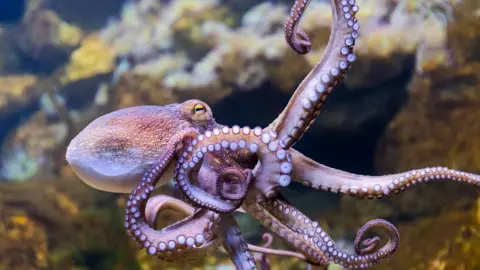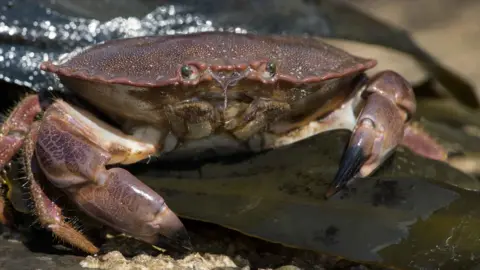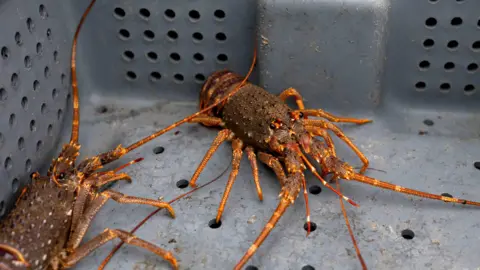Why are octopus number rising off the South West?
 Getty Images
Getty ImagesFishers are observing a notable rise in octopus sightings along England's south-west coast.
Some say an "invasion" of octopus and a local bylaw are "decimating" the Devon shellfish industry.
We asked experts what is happening beneath the waves.
What type of octopus is appearing in large numbers?
Dr Emma Sheehan, associate professor of marine ecology at the University of Plymouth, said: "We believe this is the common octopus, octopus vulgaris.
"It's one of the species most likely to be seen by divers and snorkellers around the UK.
"Another species we often encounter during underwater surveys is the curled octopus. Both are native to our waters and thrive in habitats like reefs, rocky ledges, and seagrass beds."
Carli Cocciardi, from the Devon Wildlife Trust, said: "We typically see two species in the UK, the common octopus and the curled octopus.
"The south-west of England is really the northern edge of the common octopus's range, so sightings here are significant.
"These are the species most likely to be involved in the recent increase."
 Getty Images
Getty ImagesWhy are there so many appearing now?
Dr Sheehan said: "There are a few possibilities.
"Octopuses might be moving into the area because conditions have improved, perhaps due to better food availability or improved habitat quality from better environmental management.
"Another factor could be higher survival rates, especially in early life stages, possibly due to milder winters. Reduced fishing pressure may also be playing a role."
Ms Cocciardi said: "This isn't the first time we've seen a spike. Similar increases were recorded in 1899, 1948, and again in 2022.
"The most likely cause is rising sea temperatures, which make our waters more suitable for species like the common octopus.
"Other factors could include changes in ocean currents or increased prey availability. It's interesting that the gaps between these events are shortening, perhaps it's no longer a rare cycle but a sign of more permanent change."
Dr Sheehan: "The first reports came from fishermen who found crab pots packed with octopuses, something very unusual.
"Since then, divers and snorkellers have reported more sightings, including one snorkel near Plymouth Sound where 12 octopuses were seen at once."
What do octopuses eat, and how do they hunt?
Ms Cocciardi: "Octopuses are highly intelligent predators.
"They have a parrot-like beak that can break into the shells of crabs and lobsters.
"They also inject venom that paralyses their prey and breaks down the soft tissue, turning it into a kind of soup they can slurp up.
"It sounds strange, but it's very effective."
Dr Sheehan: "They're incredibly clever. They often leave behind piles of crab legs, called middens, which are a clear sign they've been feeding.
"While crabs are a favourite, they'll also eat lobsters, crawfish, clams, cockles, and other molluscs.
"Their diet can vary depending on individual preferences and availability."
Ms Cocciardi: "They're also known for their ability to squeeze into tiny spaces and change colour to blend into their surroundings.
"These adaptations make them both effective hunters and elusive prey."
 Getty Images
Getty ImagesWhat is the long-term future?
Fishers say open escape holes in pots for juvenile shellfish, enforced by a bylaw, allow the octopuses in to eat shellfish.
The Devon and Severn Inshore Fisheries and Conservation Authority, which is responsible for implementing the bylaw, said the holes could be closed if fishers were trying to catch octopuses only, and it was working on trying to find a long-term solution.
Matt Mander, from the authority, said: "The escape holes have been around for about 20 years, the design was aimed to allow small crabs and lobster to escape, it's a conservation measure.
"Octopus are worth more than crab, so it's a profitable fishery for them.
"But we have to look at the long term because the octopus are killing crabs at quite a rate.
"We have started to work at a national and regional level on how to regulate the impact of the influx of octopus, but they have very few predators and they are very clever at what they do.
"The worry is that they will have a significant impact."
Ms Cocciardi: "I haven't seen one in the wild myself yet, but I'd love to.
"It's really important that fishermen and others report sightings, it helps us understand what's happening with the population and supports better marine management."
Dr Emma Sheehan: "From an ecologist's point of view, it's exciting to see these animals returning.
"It suggests that something is changing in the marine environment, possibly for the better."
Follow BBC Cornwall on X, Facebook and Instagram. Follow BBC Devon on X, Facebook and Instagram. Send your story ideas to [email protected].
